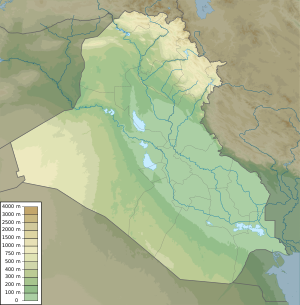| Battle of Gaugamela | |||||||||
|---|---|---|---|---|---|---|---|---|---|
| Part of the Wars of Alexander the Great | |||||||||
 Alexander the Great, victorious over Darius at the Battle of Gaugamela by Jacques Courtois | |||||||||
| |||||||||
| Belligerents | |||||||||
| Achaemenid Empire | |||||||||
| Commanders and leaders | |||||||||
| Strength | |||||||||
|
| ||||||||
| Casualties and losses | |||||||||
|
1,100–1,500[a] 1,000 cavalry 100–500 infantry |
40,000–90,000[b] 300,000+ captured (according to Arrian)[7] | ||||||||
Location within Iraq | |||||||||
The Battle of Gaugamela (/ˌɡɔːɡəˈmiːlə/ GAW-gə-MEE-lə; Ancient Greek: Γαυγάμηλα, romanized: Gaugámēla, lit. 'the Camel's House'), also called the Battle of Arbela (Ἄρβηλα, Árbēla), took place in 331 BC between the forces of the Army of Macedon under Alexander the Great and the Persian Army under King Darius III. It was the second and final battle between the two kings, and is considered to be the final blow to the Achaemenid Empire, resulting in its complete conquest by Alexander.
The fighting took place in Gaugamela, a village on the banks of the river Bumodus, north of Arbela (modern-day Erbil, in Iraqi Kurdistan). Despite being heavily outnumbered, the Army of Macedon emerged victorious due to the employment of superior tactics and the clever usage of light infantry forces. It was a decisive victory for the League of Corinth, and it led to the fall of the Achaemenid Empire and of Darius III.
- ^ Marciak, M.; Szypuła, B.; Sobiech, M.; Pirowski, T. (2021). "The Battle of Gaugamela and the Question of Visibility on the Battlefield". Iraq. 83: 87–103. doi:10.1017/irq.2021.11. S2CID 240824299.
- ^ "Gaugamela", Oxford Classical Dictionary.
- ^ "Alexander the Great – Biography, Empire and Facts", Encyclopaedia Britannica.
- ^ "Gaugamela (331 BCE)", livius.org
- ^ Cite error: The named reference
Green, Peter 2013 p.288was invoked but never defined (see the help page). - ^ Clark, Jessica H.; Turner, Brian (2017). Brill's Companion to Military Defeat in Ancient Mediterranean Society. Brill. p. 78. ISBN 978-90-04-35577-4. Retrieved 30 August 2019.
- ^ Arrian 1893.
Cite error: There are <ref group=lower-alpha> tags or {{efn}} templates on this page, but the references will not show without a {{reflist|group=lower-alpha}} template or {{notelist}} template (see the help page).


